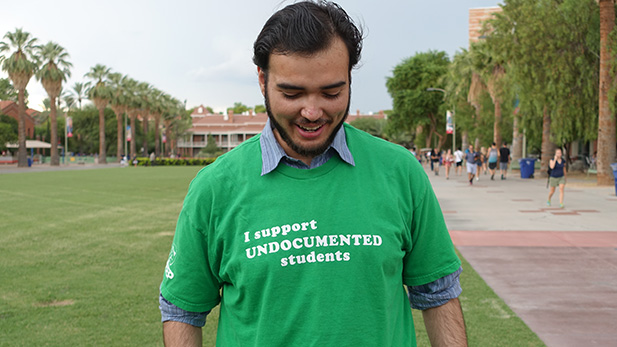 21-year old Guillermo Huerta begins his studies at the UA this week.
21-year old Guillermo Huerta begins his studies at the UA this week.Listen:
More than 42,000 University of Arizona students start classes Monday, including about 30 students who were recently granted in-state status.
Among them is 21-year old Guillermo Huerta, who will double major in computer science and cognitive science.
"What I want to do is work with artificial intelligence when I’m older," Huerta said.
Huerta is a "Dreamer," an immigrant granted deferred deportation status by the Obama administration. He and other "Dreamers," named for the federal legislation that would have given them legal status, were considered non-residents.
For Huerta, that meant a UA education was simply unattainable because of the cost.
That changed in May, when the Arizona Board of Regents voted to grant in-state tuition to students in Huerta’s position.
The decision came after a Phoenix judge upheld Maricopa Community College’s decision to charge students the in-state rate. Huerta, who’s involved in Scholarships AZ, an organization that advocates on behalf of Dreamers, said the ruling came as a welcome surprise.
Huerta studied at Pima Community College after he graduated from Sabino High School in Tucson. In the weeks following the regents' decision, he rushed to get his application into the UA and was accepted into the Honors College.
He said he expects to be busy this semester.
"I have four classes; those are all in the morning," he said. "And I’ll be working at the iPlant Collaborative."
He also will remain involved with Scholarships AZ. Huerta said he wants his classmates and the rest of the community to know the challenges undocumented students face.
"Because there’s a whole bunch of people like me who are having a really hard time with anything concerning school," he said. "Whether they’re in high school and trying to figure out the whole college process or whether they’re in community college and trying to figure out, 'How am I going to pay for the university?'"
Although Dreamers now qualify for in-state tuition, they are not eligible for financial aid from the university or the state. Huerta saved money to pay for this semester and is seeking scholarships.
That laves him with a question: "What will happen if I run out of money?"
He said he tries not to worry about it and is instead focusing on success.
"I have an uncle that says it doesn’t matter what you do, as long as you’re the best at it," Huerta said. "But I also want to make sure that whatever I do helps a lot of people, too."

By submitting your comments, you hereby give AZPM the right to post your comments and potentially use them in any other form of media operated by this institution.